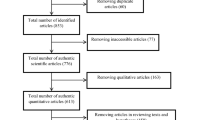Abstract
This is a cross-cultural study that explores the relationship between entrepreneurs’ social intelligence and firm performance in six countries (China, Malaysia, Bangladesh, France, Ireland, and Turkey). These firms were founded during the 7 years preceding the study. Data for this study were collected with questionnaires from three managers of each firm who rated their founding CEOs on social intelligence and performance of their firms. Data from each firm were averaged. Data analyses in each sample with structural equations models suggest that CEOs with greater social intelligence contributed more to firm performance in each country. Implications for management, directions for future research, and limitations of the study are discussed.
Abstrait
Cette étude multiculturelle explore la relation entre l’intelligence sociale des entrepreneurs et la performance de leurs entreprises dans six pays (Chine, Malaisie, Bangladesh, France, Irlande et Turquie). Ces entreprises ont été créées au cours des sept années précédant l’étude. Les données ont été recueillies à l’aide de questionnaires envoyées à trois dirigeants de chaque entreprise, qui ont évalué leurs dirigeants fondateurs en matière d’intelligence sociale et de performance de l’entreprise. Les données de chaque entreprise ont été moyennées. Les analyses de données dans chaque échantillon avec des modèles d’équations structurelles suggèrent que les PDG ayant une plus grande intelligence sociale ont davantage contribué à la performance des entreprises dans chaque pays. Les implications pour la gestion, les orientations pour les recherches futures et les limites de l’étude sont discutées.

Similar content being viewed by others
References
Albrecht K (2007) Social intelligence: the new science of success. Jossey-Bass, San Francisco
Anderson JC, Gerbing DW (1988) Structural equation modeling in practice: a review and recommended two-step approach. Psychol Bull 103:411–423
Ang RP, Goh DH (2010) Cyberbullying among adolescents: the role of affective and cognitive empathy, and gender. Child Psychiatry: Human Development 41:387–397
Argyris C, Schon D (1996) Organizational learning–II. Reading, Addison-Wesley
Baron RA (2008) The role of affect in the entrepreneurial process. Acad Manag Rev 33:328–340
Baron RA, Ensley MD (2006) Opportunity recognition as the detection of meaningful patterns: evidence from comparisons of novice and experienced entrepreneurs. Manag Sci 52:1331–1344
Baron RA, Markham GD (2000) Beyond social capital: how social skills can enhance entrepreneurs’ success. Acad Manag Exec 14:106–116
Baron RA, Tang J (2009) Entrepreneurs’ social skills and new venture performance: mediating mechanisms and cultural generality. J Manag 35:282–306
Baron RA, Hmicleski KM, Henry RA (2012) Entrepreners’ dispositional positive affect: the potential benefits—and potential costs—of being “up”. J Bus Ventur 27:310–324
Bennis WG, Thomas RJ (2002) Geeks and geezers. Harvard Business School Press, Cambridge
Burch G, Batchelor J, Humphrey J (2013) Emotional labor for entrepreneurs: a natural and necessary extension. Entrep Res J 3:331–366
Carr CL (2002) A psychometric evaluation of the expectations, perceptions, and difference-scores generated by the IS–Adapted SERVQUAL Instrument. Decis Sci 33:281–296
Cherniss C, Adler M (2000) Promoting emotional intelligence in organizations: making training in emotional intelligence effective. ASTD, Alexandria
Davidson JE, Downing CL (2000) Contemporary models of intelligence. In: Sternberg R (ed) Handbook of intelligence. Cambridge University Press, New York, pp 34–49
Endsley MR (1995) Measurement of situation awareness in dynamic systems. Hum Factors 37:65–84
Gardner H (1983) Frames of mind: the theory of multiple intelligences. Basic Books, New York
Goleman D (1998) Working with emotional intelligence. Bantum Books, New York
Goleman D (2005) Social intelligence: the new science of human relationships. Bantum Books, New York
Hayton JC, Cholakova M (2012) The role of affect in the creation and international pursuit of entrepreneurial ideas. Enterp Theory Pract 36:41–67
Jöreskog KG, Sörbom D (1996a) LISREL 8: user’s reference guide. Scientific Software International, Chicago
Jöreskog KG, Sörbom D (1996b) PRELIS 2: user’s reference guide. Scientific Software International, Chicago
Judge TA, Colbert AE, Ilies R (2004) Intelligence and leadership: a quantitative review and test of theoretical propositions. J Appl Psychol 89:542–552
Kaukiainen A, Bjorkqvist K, Lagerspetz K, Osterman K, Salmivalli C, Rothberg S, Ahlbom A (1999) The relationships between social intelligence, empathy, and three types of aggression. Aggress Behav 25:81–89
Kihlstrom JF, Cantor N (2000) Social intelligence. In: Sternberg RJ (ed) Handbook of intelligence, 2nd edn. Cambridge University Press, Cambridge, pp 359–379
Loniel SC, Carter RE, Parker S (2015) The impact of organizational orientation on medium and small firm performance: a resource-based perspective. J Small Bus Perspect 53:94–113
Matusitz J, Forrester M (2009) Successful glocalization practices: the case of Seiyu in Japan. J Trans Manag 14(2):155–176
Mayer JD, Salovey P, Caruso DR (2008) Emotional intelligence: new ability or eclectic traits? Am Psychol 63:503–517
Mitroff II (1998) Smart thinking for crazy times: the art of solving the right problems. Berrett-Koehler, San Francisco
Mitroff II, Silvers A (2010) Dirty rotten strategies: how we trick ourselves and others into solving the wrong problems precisely. Stanford University Press, Stanford
Mossholder KW, Bennett N, Kemery ER, Wesolowski MA (1998) Relationships between bases of power and work reactions: the meditational role of procedural justice. J Manag 24:533–552
O’Brien KS, O’Hare D (2007) Situational awareness ability and cognitive skills training in a complex real-world task. Ergonomics 50:1064–1091
Podsakoff PM, MacKenzie SB, Lee JY, Podsakoff NP (2003) Common method bisases in behavioral research: a critical review of the literature and recommended remedies. J Appl Psychol 88:879–903
Poon JML, Ainuddin RA, Junit SH (2006) Effects of self-report traits and entrepreneurial orientation and performance. Int Small Bus J 24:61–82
Rahim MA (2014) A structural equations model of leaders’ social intelligence and creative performance. Creat Innov Manag 23:44–56
Rahim MA, Bonoma TV (1979) Managing organizational conflict: a model for diagnosis and intervention. Psychol Rep 44:1323–1344
Rahim MA, Kim T-Y, Jasimuddin SA, Soranastaporn S, Rahman MS (2014) A cross-cultural model of leaders’ social intelligence and creative performance. Curr Top Manag 17:155–175
Rahim MA, Civelek I, Liang H (2015a) A model of department chairs’ social intelligence and faculty members’ turnover intention. Intelligence 53:65–71
Rahim MA, Civelek I, Liang H (2015b) Department chairs as leaders: a model of social intelligence and creative performance in a state university. Bus Creaty & Creativ Econ 1(1):53–60
Rahim MA, Civelek I, Liang H (2016) A model of leaders’ social intelligence and followers’ satisfaction with annual evaluation. Curr Top Manag 18:1–16
Rahim MA, Civelek I, Liang H (2018) A process model of social intelligence and problem solving style for conflict management. Int J Confl Manag 29:487–499
Schmidt WH, Tannenbaum R (1990) Management of differences. Harv Bus Rev 107–115
Sternberg RJ (1985) The triarchic mind: a new theory of human intelligence. Viking, New York
Sternberg RJ (2002) Successful intelligence: a new approach to leadership. In: Riggio RE, Murphy SE, Pirozzolo FJ (eds) Multiple intelligences and leadership. Erlbaum, Mahwah, pp 9–28
van Dyne L, Ang S, Koh CKS (2008) Cultural intelligence: measurement and scale development. In: Moodian MA (ed) Contemporary leadership and intercultural competence: exploring the cross-cultural dynamics within organizations. Sage, Thousand Oaks, pp 233–254
Wagner RK (2000) Practical intelligence. In: Stenberg R (ed) Handbook of intelligence. Cambridge University Press, New York, pp 380–395
Wang CL (2008) Entrepreneurial orientation, learning orientation, and firm performance. Enterp Theory Pract 32:636–657
Zautra AJ, Zautra EK, Rivers C, Rivers D (2013) Foundations of social intelligence: a conceptual model with implications for business performance. Curr Top Manag 16:15–36
Acknowledgments
We express our sincere thanks to the two anonymous reviewers for their constructive comments that helped to improve the paper. We also express our sincere thanks to the Editor for their help and support in improving the manuscript.
Author information
Authors and Affiliations
Corresponding author
Additional information
Publisher’s note
Springer Nature remains neutral with regard to jurisdictional claims in published maps and institutional affiliations.
Appendix
Appendix
Rights and permissions
About this article
Cite this article
Rahim, M.A., Ma, Z., Quah, CS. et al. Intelligent entrepreneurship and firm performance: A cross-cultural investigation. J Int Entrep 17, 475–493 (2019). https://doi.org/10.1007/s10843-019-00252-5
Published:
Issue Date:
DOI: https://doi.org/10.1007/s10843-019-00252-5




